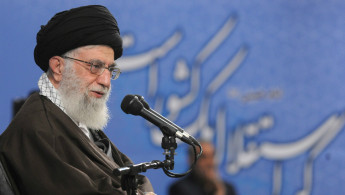Iran's Khamenei blames mass price hike protests on 'dangerous US-backed conspiracy'
Iran's Supreme Leader Ayatollah Ali Khamenei has dismissed recent mass protests against the government as a "dangerous conspiracy", backed in part by the US and Israel.
The unrest, triggered by a sharp rise in petrol prices, came after a year and a half of biting sanctions reimposed by President Donald Trump that aim to contain Iran's regional role.
Amnesty International says it believes at least 143 people have been killed in a crackdown on the protests, something Iran disputes without offering any evidence to support its claims.
Read more: Iranians are caught between biting sanctions and a brutal crackdown
Supreme Leader Ayatollah Ali Khamenei on Wednesday said his sanctions-hit country had foiled a "very dangerous" plot.
"The people foiled a deep, vast and very dangerous conspiracy on which a lot of money was spent for destruction, viciousness and the killing of people," Khamenei was quoted as saying on state television.
Iran has blamed the unrest on "thugs" backed by its foreign enemies, including the US, Israel and the People's Mujahedeen of Iran, an exiled armed opposition group it considers a "terrorist" cult.
| |
On Twitter, Khamenei expressed his "heartfelt gratitude and appreciation" to the Iranian nation in a post that featured pictures of a massive pro-government rally held Monday in Tehran.
The tweets accused the "#GlobalArrogance and #Zionism" - referring to Iran's arch-enemies the US and Israel - of being behind the street violence.
Late on Wednesday, state news agency IRNA reported that eight people accused of links to the CIA and gathering information to send abroad had been arrested.
"Some elements who tried to collect information about the recent riots and send them out of the country... were identified and arrested," it quoted the director-general of the intelligence ministry's counter-espionage department as saying.
Six of them were alleged to have been "attending the riots and carrying out orders," IRNA reported, without naming the official.
Two others accused of trying to collect information and transfer it abroad were arrested before they could leave the country, the news agency said.
A near-total internet blackout was imposed by the Islamic republic on 16 November, the day after it made the shock announcement that petrol prices were immediately going up by as much as 200 percent.
Reports of deaths and arrests emerged as security forces were deployed to rein in demonstrations which turned violent in some areas, with dozens of banks, petrol pumps and police stations torched.
The street violence has left more than 350 people dead and around 15,000 wounded since the start of October.
Public anger over a lack of jobs fuelled the latest grassroots protests, Iraq's most widespread and deadly in decades.
One in five people lives below the poverty line and youth unemployment hovers at a staggering 25 percent, the World Bank says.





 Follow the Middle East's top stories in English at The New Arab on Google News
Follow the Middle East's top stories in English at The New Arab on Google News
![Netanyahu furiously denounced the ICC [Getty]](/sites/default/files/styles/image_330x185/public/2024-11/GettyImages-2169352575.jpg?h=199d8c1f&itok=-vRiruf5)
![Both Hamas and the Palestinian Authority welcomed the ICC arrest warrants [Getty]](/sites/default/files/styles/image_330x185/public/2024-11/GettyImages-2178351173.jpg?h=199d8c1f&itok=TV858iVg)
